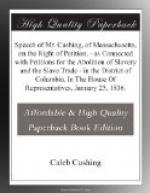The members of this House have been frequently called, during the present session, to vote upon divisions connected with petitions of this nature. On those occasions I have been content to pronounce my vote simply, and without explanation, leaving my reasons and motives to be construed or misconstrued by others, as chance might order. To have continued so to do, until the subject of present controversy were finally disposed of, is the part I should altogether have chosen, had circumstances permitted to me such a course. But, if I have been a silent, I have not been an incurious, nor, I trust, an uninstructed, spectator of events. It is rendered apparent that those great matters, which occupy the public mind abroad, do now occupy also this House. If other gentlemen, differing with me in part or in whole, had voted without discussion, according to the dictates of their individual judgment, each of us could fairly have stood upon his personal convictions, and his personal estimation elsewhere, for his justification in the eyes of his countrymen. But that, much as it were in my view to be desired, is no longer possible. What has happened here is enrolled already in the unchangeable records of time and of eternity. It is become history. It cannot be recalled; it cannot be blotted from the memory; it cannot be expunged from the annals of the country. The winged words uttered in this House have gone forth to the world, on their mission of good or of evil. Debate we have; debate we must have; we are goaded into debate; it is forced upon us; and from a quarter of the Union whence, I am frank to say, I did not look for it to come; and forced upon us in terms of dictation, which I cannot brook; since they leave to me no alternative of escape from debate, but in the passive surrender of some of the dearest of our birthrights, those of free petition, free speech, and free conscience. I say, of free speech and free conscience, both which are involved in the resolutions moved some time since by a gentleman from Maine, (Mr. Jarvis.) When these resolutions shall be distinctly before the House, it will become its members to reflect whether they have the constitutional right to attempt, or attempting, have the power to enforce, what those resolutions seem to contemplate, a perpetual prohibition of debate, and even of motions, upon a large and comprehensive class of subjects. These rights, neither my constituents nor myself feel disposed to surrender; and upon one of these great liberties of the land, and for the sake of incidentally vindicating the others, I shall, in due time, address the House at length.
My only object at this time, is to come to a fair understanding with the House as to the cause to be pursued in the debate, and the disposition it will make of these Petitions.
At a very early period of the session, a gentleman from South Carolina (Mr. Hammond) met such petitions with the motion that they be not received. All the debates, which ensued thereon, terminated in evasive and unsatisfactory votes for laying on the table, which left every question of principle unsettled.




